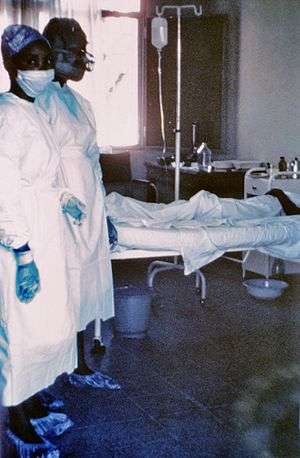Mayinga N'Seka
Mayinga N'Seka (1954 – October 19, 1976) was a nurse in Zaïre, now Democratic Republic of the Congo. She died from Ebola virus disease during the 1976 epidemic in Zaïre. She has been incorrectly identified as the index case by several sources, but a World Health Organization commission report on the outbreak lists a man from Yambuku, Mabalo Lokela, as the index case.[1]

Biography
N'Seka worked as a nurse at Mbalad hospital in Kinshasa and contracted Ebola after caring for a nun who had flown in for treatment from the Yambuku Mission Hospital, where the outbreak began. Mayinga died at Ngaleima Hospital on 19 October 1976. There were 318 cases in this outbreak, which had an 88% mortality rate.[1]
In his book about the 1976 outbreak, Ebola, William Close writes that N'Seka had treated a nun, Sister Fermina, who worked at the Catholic mission in Yambuku, the center of the outbreak. Fermina died at the hospital in Kinshasa while trying to return to Belgium so a diagnosis on the disease could be performed. The highly infectious and deadly nature of the disease was still unknown when N'Seka treated Fermina, and no special precautions were taken to prevent contact with the nun's blood or fluids. 22-year-old N'Seka was preparing to travel to Europe to study advanced nursing on a scholarship at the time of her death. N'Seka was born in 1954.
Legacy
The variant of the Ebola virus that infected N'Seka was originally named "Zaïre virus strain Mayinga" (now Ebola virus variant Mayinga; EBOV/May), and is the prototype virus for the species Zaire ebolavirus, which is itself the type species for the genus Ebolavirus.[2][3]
N'Seka's blood has also been used all over the world in procuring various strain frequencies and structures about Ebola virus.
References
- "Ebola hemorrhagic fever in Zaire, 1976" (PDF). Bulletin of the World Health Organization. 56 (6): 271. 1978. Archived from the original (PDF) on 8 August 2014. Retrieved 4 August 2014.
- http://jvi.asm.org/content/79/4/2413.full
- Kuhn, Jens H.; Becker, Stephan; Ebihara, Hideki; Geisbert, Thomas W.; Johnson, Karl M.; Kawaoka, Yoshihiro; Lipkin, W. Ian; Negredo, Ana I; et al. (2010). "Proposal for a revised taxonomy of the family Filoviridae: Classification, names of taxa and viruses, and virus abbreviations". Archives of Virology. 155 (12): 2083–103. doi:10.1007/s00705-010-0814-x. PMC 3074192. PMID 21046175.